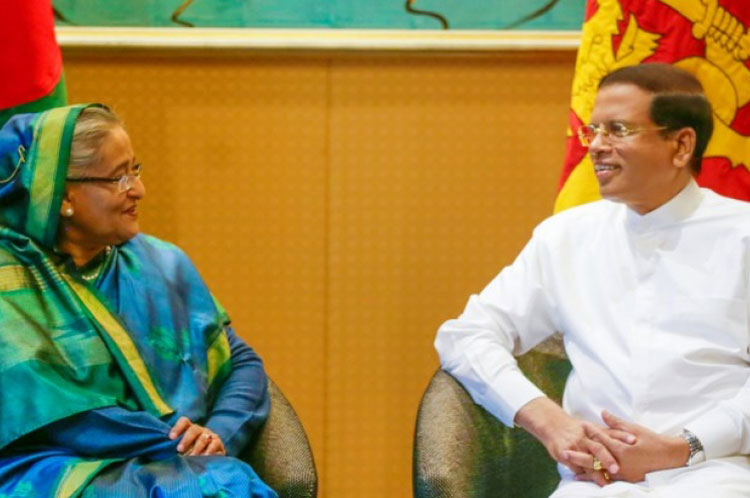May 30, 2016 Reading Time: 2 minutes

Bangladeshi Prime Minister Sheikh Hasina and President Maithripala Sirisena hold bilateral discussions in Japan. Image credit - news.lk
Reading Time: 2 min read
Japan assists Sri Lankan development projects
The Prime Minister of Japan, Shinzō Abe, and President Sirisena have announced that Japan will provide JPY 38 billion towards power transmission and water supply projects in Sri Lanka. The announcement was made during a bilateral meeting at the G7 summit in Japan.
Japan will assist with the construction of transmission lines in the North Central and Eastern Provinces, and water supply facilities in the North Central Province.
Bilateral meeting held between Sri Lanka and Bangladesh
The Prime Minister of Bangladesh, Sheikh Hasina, and President Sirisena have agreed to strengthen trade relations at a bilateral meeting in Japan.
The leaders agreed to establish a stable pricing method for the garment trade, strengthen investment cooperation, and implement a favourable system of purchasing high-quality medicine.
State Secretary of Norway to visit Sri Lanka
The State Secretary of the Norwegian Ministry of Foreign Affairs, Tore Hattrem, is scheduled to visit the Minister of Foreign Affairs, Mangala Samaraweera, on 31 May.
This meeting follows the visit made by the Norwegian Minister of Foreign Affairs, Børge Brende, earlier this year.
Syrian opposition negotiator resigns
Mohammed Alloush, the chief negotiator of Syria’s main opposition group, the High Negotiations Committee (HNC), has resigned stating that the UN-backed peace talks have failed to reach a political deal.
In April 2016, the HNC, backed by Saudi Arabia, suspended its formal participation in peace talks. A date has not been set for their resumption.
Uganda suspends military and security ties with North Korea
Following a summit in Uganda with South Korean President Park Geun-hye, the Ugandan President Yoweri Museveni has stated that Uganda would halt security and military cooperation with North Korea.
By suspending military ties, Uganda aims to comply with UN sanctions on North Korea. The sanctions ban North Korea from all military links with foreign countries, including weapons trade and training contracts.
King of Jordan dissolves parliament
The King of Jordan, Abdullah II, dissolved parliament and appointed Hani al-Mulki as Prime Minister. Hani al-Mulki has held senior government posts, including the Minister of Foreign Affairs, in previous administrations.
This follows the resignation of Prime Minister Abdullah Ensour, and under the constitution, parliamentary elections would need to follow within four months.